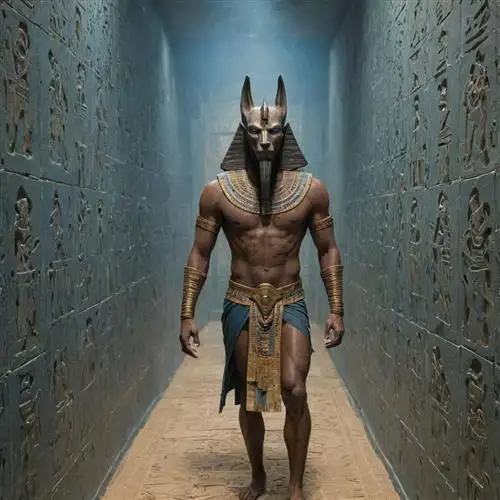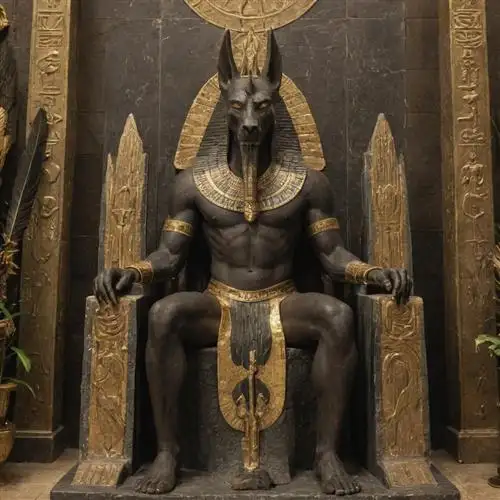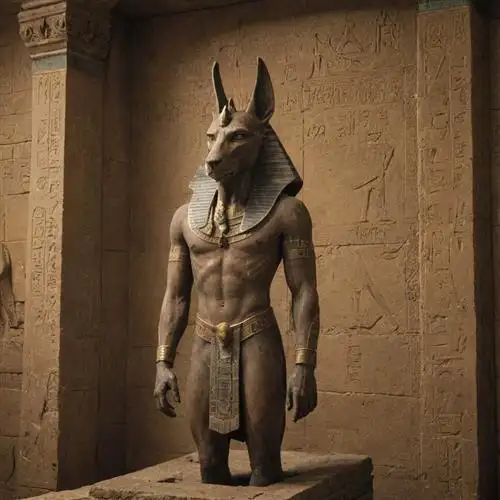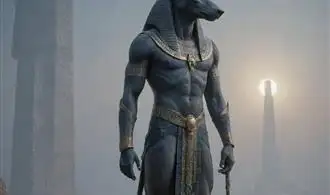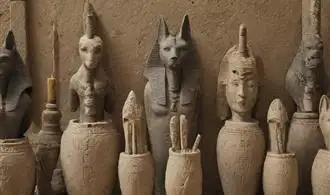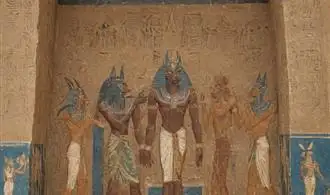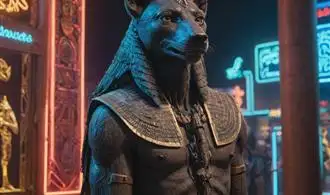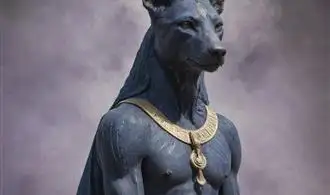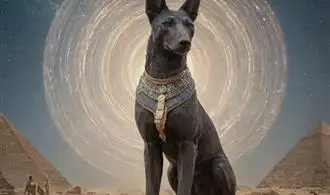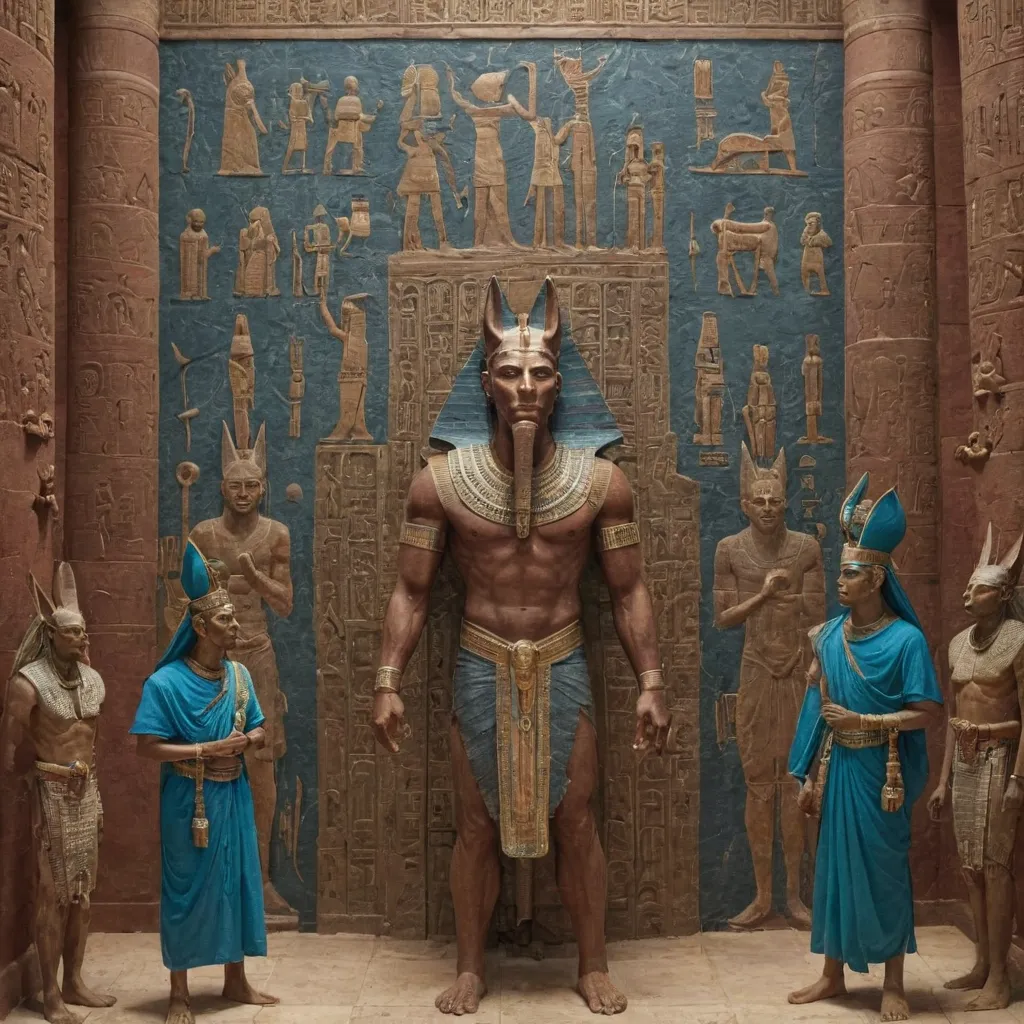
Anubis Presides Over the Dead
In the pantheon of ancient Egyptian deities, Anubis stands out as the enigmatic figure who presides over the realm of the dead. As the jackal-headed god, Anubis is responsible for the critical process of mummification, guiding the deceased through the perilous journey to the afterlife. His role is as multifaceted as the complexities of the Egyptian conception of the afterlife itself.
Anubis' dominion over the dead is rooted in his association with the embalming process. As the patron of embalmers, he oversaw the meticulous rituals that transformed the deceased into an immortal being, capable of eternal existence in the afterlife. From the initial cleansing of the body to the intricate wrapping of the mummy, Anubis ensured that the physical vessel was prepared to house the ka (the life force) and the ba (the soul) of the individual.
But Anubis' responsibilities did not end with the completion of mummification. He was also tasked with guiding the deceased through the treacherous underworld, known as the Duat, and overseeing the pivotal moment of judgment before the divine tribunal. In the famous "weighing of the heart" ceremony, Anubis would place the heart of the deceased on one side of a scale, while the feather of truth, representing Ma'at (the principle of cosmic order), was placed on the other. Only those whose hearts were found to be in balance with the feather were deemed worthy of eternal life in the afterworld.
Anubis' role in the judgment of the dead was critical, as he determined the fate of the individual's soul. If the heart was found wanting, the soul would be devoured by the monstrous Ammit, a composite creature with the head of a crocodile, the torso of a lion, and the hindquarters of a hippopotamus. This terrifying entity represented the devouring of the unworthy, ensuring that the soul would cease to exist in the afterlife.
Anubis Guides the Dead to the Afterlife
Anubis, the jackal-headed deity, was revered as the most powerful Egyptian god, with a vital role in guiding the dead to the afterlife. As the god of the dead, embalming, and the underworld, Anubis' importance in the Egyptian pantheon cannot be overstated. His connection to the afterlife was so profound that he was responsible for the entire process of transition, from the moment of death to the final judgment.
One of Anubis' primary duties was to preside over the mummification process. As the patron of embalmers, he oversaw the meticulous preparation of the deceased, ensuring the body was properly preserved for the journey to the afterlife. This ritual was not only a practical necessity but also a sacred one, as Anubis was believed to be present, guiding the embalmers and imbuing the process with divine power.
But Anubis' role extended far beyond the physical realm. He was also responsible for the spiritual journey of the deceased, guiding the soul through the treacherous underworld and towards the final judgment before Osiris, the ruler of the dead. In this capacity, Anubis was known as the "Opener of the Ways," a title that reflected his ability to navigate the complex and often perilous pathways of the afterlife.
The weighing of the heart ceremony, a crucial step in the afterlife, was overseen by Anubis. During this ritual, the deceased's heart was weighed against the feather of truth, symbolizing the balance between the individual's actions and the cosmic order. Anubis, with his keen eye and unwavering judgment, would ensure the accuracy of this process, determining the fate of the soul based on the verdict.
Anubis Weighs the Hearts of the Dead
One of the most crucial duties of Anubis, the ancient Egyptian god of the dead, was the weighing of the hearts of the departed. This solemn ritual, known as the "Weighing of the Heart," was a pivotal moment in the afterlife journey of the deceased. Anubis, the jackal-headed deity, would carefully place the heart of the dead on one side of a scale, while the feather of Ma'at, the goddess of truth and justice, would rest on the other. This delicate balance determined the fate of the soul, as a heart that outweighed the feather was considered impure, dooming the individual to eternal damnation.
The significance of this ritual cannot be overstated. It served as a testament to the importance of living a virtuous life, free from sin and wrongdoing. The heart, believed to be the seat of the soul, was scrutinized by Anubis, who would ensure that it was pure and worthy of eternal rest in the afterlife. This meticulous process was a reflection of the ancient Egyptians' deep reverence for justice, truth, and the sanctity of the soul.
Anubis' role as the overseer of this pivotal moment was not merely symbolic; it was a manifestation of his power and authority over the realm of the dead. As the god who guided the deceased through the treacherous journey to the afterlife, Anubis held the keys to the ultimate fate of the soul. His judgment, wielded with unwavering precision, determined whether the individual would be granted eternal peace or condemned to eternal torment.
The Anubis Speaks - Bold Statements From the Jackal God article delves deeper into the powerful and commanding presence of this enigmatic deity. Anubis' role as the gatekeeper of the afterlife, his fierce protection of the dead, and his uncompromising stance on justice and truth are all explored in this insightful piece.
Anubis Protects the Mummified Dead
Anubis, the jackal-headed Egyptian god, is revered for his role in guiding and protecting the mummified dead. As the god of the dead, embalming, and the underworld, Anubis played a crucial part in the ancient Egyptian funerary rituals, ensuring the safe passage of the deceased into the afterlife. His unwavering dedication to this sacred duty solidified his status as one of the most powerful deities in the Egyptian pantheon.
One of the primary responsibilities of Anubis was to oversee the mummification process. The ancient Egyptians believed that the preservation of the physical body was essential for the soul's journey into the afterlife. Anubis was responsible for the embalming rituals, ensuring that the body was properly prepared and purified. He would also guide the soul of the deceased through the trials and tribulations of the underworld, protecting them from the dangers that lurked within.
During the mummification process, Anubis would watch over the body, ensuring that the proper incisions were made and the internal organs were removed and preserved. He would then carefully wrap the body in linen bandages, sealing in the essence of the individual and preparing them for their final resting place. This meticulous attention to detail was crucial, as the Egyptians believed that any mistakes during the mummification process could have disastrous consequences for the deceased in the afterlife.
In addition to his role in the mummification rites, Anubis was also responsible for guiding the soul of the deceased through the underworld. He would accompany the soul during their journey, protecting them from the various dangers and obstacles that they would encounter. This included guiding the soul through the Hall of Judgment, where the deceased would be weighed against the feather of Ma'at, the goddess of truth and justice. Anubis would then present the soul to the gods, ensuring that they had been properly judged and could continue their journey to the afterlife.
Anubis Presides Over Funerary Rites
Anubis, the jackal-headed god of the ancient Egyptian pantheon, was closely associated with the funerary rites and the afterlife. As the gatekeeper to the realm of the dead, Anubis played a pivotal role in the journey of the deceased from this world to the next. His presence and influence were integral to the successful transition of the soul into the afterlife.
Anubis presided over the crucial process of mummification, which was believed to be essential for the preservation of the physical body. The jackal-headed god oversaw the meticulous preparation of the corpse, ensuring that every step was carried out with the utmost care and reverence. This included the removal of the internal organs, the desiccation of the body, and the wrapping of the remains in linen bandages.
Moreover, Anubis was responsible for the weighing of the heart ceremony, a pivotal moment in the ancient Egyptian afterlife. During this ritual, the deceased's heart was placed on a scale and weighed against the feather of truth, representing the goddess Maat. If the heart was found to be pure and free of sin, the soul was granted passage to the afterlife. Anubis, as the guardian of this sacred ceremony, ensured the fairness and accuracy of the process, determining the fate of the deceased.
The jackal-headed god also guided the deceased through the dangerous and treacherous underworld, known as the Duat. Anubis was believed to lead the souls of the dead through this perilous realm, protecting them from the various threats and challenges they would encounter along the way. His presence and guidance were crucial in ensuring the safe passage of the deceased to the next life.
In addition to his role in the funerary rites and the afterlife, Anubis was also associated with the embalming process and the preservation of the dead. His knowledge and expertise in the art of mummification were highly revered, and he was often depicted in funerary scenes, overseeing the various stages of the embalming procedure.


